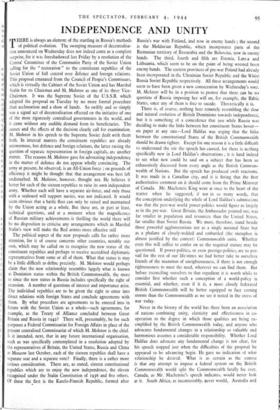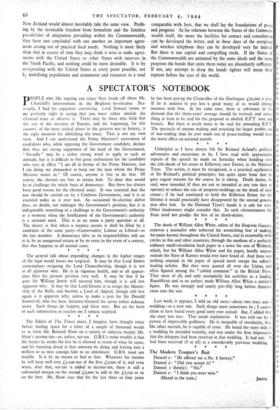INDEPENDENCE AND UNITY
THERE is always an element of the startling in Russia's methods of political evolution. The sweeping measure of decentralisation announced on Wednesday does not indeed come as a complete surprise, for it was foreshadowed last Friday by a resolution of the Centre Committee of the Communist Party of the Soviet Union calling for the " restoration " to the constituent republics of the Soviet Union of full control over defence and foreign relations. This proposal emanated from the Council of Peopie's Commissars, which is virtually the Cabinet of the Soviet Union and has Marshal Stalin for its Chairman and M. Molotov as one of its three ViceChairmen. It was the Supreme Soviet of the U.S.S.R. which adopted the proposal on Tuesday by no more formal procedure than acclamation and a show of hands. So swiftly and so simply was a signal act of decentralisation effected on the initiative of one of the most rigorously centralised governments in the world, and it came without any audible demand from its beneficiaries. The causes and the effects of the decision clearly call for examination. M. Molotov in his speech to the Supreme Soviet dealt with them both. In internal matters the constituent republics are already autonomous, but defence and foreign relations, the latter raising the question of separate representation in foreign capitals, are another matter. The reasons M. Molotov gave for advocating independence in the matter of defence do not appear wholly convincing. The army at present, he observed, is an All-Union force ; on grounds of efficiency it might be thought that that arrangement was best left undisturbed. M. Molotov, however, thought not. He believes it better for each of the sixteen republics to raise its own independent army. Whether each will have a -separate air-force, and only those with a seaboard will support navies, was not indicated. It would seem obvious that a battle fleet can only be raised and maintained by the Union acting as a whole. But these are, in part at least, technical questions, and at a moment when the magnificence of Russian military achievements is thrilling the world there will be no disposition to criticise any arrangements which in Marshal Stalin's view will make the Red armies more effective still The political aspect of the new proposals calls for rather more attention, for it of course concerns other countries, notably our own, which may be called on to recognise the new status of the constituent republics and perhaps to receive accredited diplomatic representatives from some or all of them. What that status is may be a little difficult to define precisely. M. Molotov would perhaps claim that the new relationship resembles lagely what is known as Dominion status within the British Commonwealth, the more so since the new status in Russia includes specifically the right of secession. A number of questions of interest and importance arise. The individual republics are to be given the right to enter into direct relations with foreign States and conclude agreements with them. By what procedure are agreements to be entered into in future with the Soviet Union as a whole—such agreements, for example, as the Treaty of Alliance concluded between Great Britain and Russia in 1942? There will, presumably, be for such purposes a Federal Commissariat for Foreign Affairs in place of the present centralised Commissariat of which M. Molotov is the chief. Is it intended, next, that in any future international organisation, such as was specifically contemplated in a resolution adopted by the representatives of Britain, the United States, Russia and China at Moscow last October, each of the sixteen republics shall have a separate seat and a separate vote? Finally, there is a rather more serious consideration. There are, as stated, sixteen constitutional republics which are to enjoy the new independence, the eleven recognised under the Stalin Constitution of 1936 and five others. Of these the first is the Karelo-Finnish Republic, formed after Russia's war with Finland, and now in enemy hands ; the second is the Moldavian Republic, which incorporates parts of the Rumanian territory of Bessarabia and the Bukovina, now in enemy hands. The third, fourth and fifth are Estonia, Latvia and Lithuania, which seem to be on the point of being wrested from enemy hands. The eastern provinces of pre-war Poland had already been incorporated in the Ukrainian Soviet Republic and the White Russia Soviet Republic respectively. All these arrangements would seem to have been given a new consecration by Wednesday's vote. M. Molotov will be in a position to protest that there can be no question of Russia imposing her will on, for example, the Baltic States, since any of them is free to secede. Theeretically it is.
There is, of course, nothing here remotely resembling the slow and natural evolution of British Dominions towards independence, but it is something of a coincidence that just while Russia was deciding to make the links between her constituent States looser— on paper at any rate—Lord Halifax was urging that the links between the constitutional States of the British Commonwealth should be drawn tighter. Except for one reason it is a little difficult to understand the stir the speech has caused, for there is nothing specifically new in Lord Halifax's observations ; it is hard indeed to see what new could be said on a subject that has been so exhaustively discussed from every angle as the British Commonwealth of Nations. But the speech has produced swift reactions. It was made in a Canadian city, and it is fitting that the first authoritative comment on it should come from the Prime Minister of Canada. Mr. Mackenzie King went at once to the heart of the matter when he suggested, if not in so many words, that the conception underlying the whole of Lord Halifax's submissions was that the post-war world power-politics would figure as largely as in the pre-war. Great Britain, the Ambassador pointed out, was far smaller in population and resources than the United States, far smaller than Soviet Russia. We must, therefore, stand beside those powerful agglomerations not as a single national State but as a phalanx of closely-welded and embattled (the metaphor is almost justified by the context) Commonwealth units. Whether even this will suffice to confer on us the required stature may be questioned. If power-politics, or even prestige-politics, are to prevail for the rest of our life-times we had better take to ourselves friends of the mammon of unrighteousness, if there is not enough righteousness to meet the need, wherever we can find them. But before reconciling ourselves to that expedient it is worth while to consider first whether such a conception of a world-policy is essential, and whether, even if it is, a more closely federated British Commonwealth will be better equipped to face coming storms than the Commonwealth as we see it tested in the stress of war today.
Never in the history of the world has there been an association of nations combining unity, elasticity and effectiveness in cooperation to the degree in which those qualities are being exemplified by the British Commonwealth today, and anyone who advocates fundamental changes in a relationship so valuable and harmonious assumes a considerable responsibility. Whether Lord Halifax does advocate any fundamental change is not clear, for his speech stopped just when the difficulties of the proposal he appeared to be advancing begin. He gave no indication of what relationship he desired. What is as certain as the sunrise is that any attempt to impose a federal system on the British Commonwealth would split the Commonwealth fatally foi ever. Canada, as Mr. Mackenzie's speech indicates, would never look at it. South Africa, as incontestably, never would, Australia and New Zealand would almost inevitably take the same view. Profiting by the invaluable freedom from formalism and the limitless possibilities of adaptation prevailing within the Commonwealth, they have just concluded with one another an important agreement arising out Of practical local .needs. Nothing is more likely than that in course of time they may think it wise to make agreements with the United States or other States with interests in the South Pacific, and nothing could be more desirable. It is by co-operating with the United States at every point possible, not by mobilising populations and armaments and resources to a total comparable with hers, that we shall lay the foundations of peace and progress. AS for relations between the States of the Commonwealth itself, the more the facilities for contact and consultation can be developed the better, and in these days of the aeroplane and wireless telephone they can be developed very far indeed. But there is one capital and compelling truth. If the States of the Commonwealth are animated by the same ideals and the same purposes the bonds that unite them today are abundantly sufficient. If not, any attempt to draw the bonds tighter will mean .their rupture before the eyes of the world.























 Previous page
Previous page